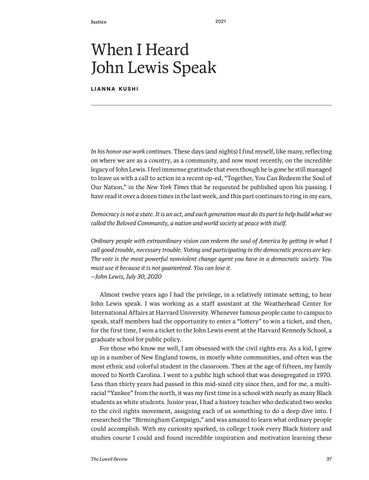Justice
2021
When I Heard John Lewis Speak lianna kushi
In his honor our work continues. These days (and nights) I find myself, like many, reflecting on where we are as a country, as a community, and now most recently, on the incredible legacy of John Lewis. I feel immense gratitude that even though he is gone he still managed to leave us with a call to action in a recent op-ed, “Together, You Can Redeem the Soul of Our Nation,” in the New York Times that he requested be published upon his passing. I have read it over a dozen times in the last week, and this part continues to ring in my ears, Democracy is not a state. It is an act, and each generation must do its part to help build what we called the Beloved Community, a nation and world society at peace with itself. Ordinary people with extraordinary vision can redeem the soul of America by getting in what I call good trouble, necessary trouble. Voting and participating in the democratic process are key. The vote is the most powerful nonviolent change agent you have in a democratic society. You must use it because it is not guaranteed. You can lose it. —John Lewis, July 30, 2020 Almost twelve years ago I had the privilege, in a relatively intimate setting, to hear John Lewis speak. I was working as a staff assistant at the Weatherhead Center for International Affairs at Harvard University. Whenever famous people came to campus to speak, staff members had the opportunity to enter a “lottery” to win a ticket, and then, for the first time, I won a ticket to the John Lewis event at the Harvard Kennedy School, a graduate school for public policy. For those who know me well, I am obsessed with the civil rights era. As a kid, I grew up in a number of New England towns, in mostly white communities, and often was the most ethnic and colorful student in the classroom. Then at the age of fifteen, my family moved to North Carolina. I went to a public high school that was desegregated in 1970. Less than thirty years had passed in this mid-sized city since then, and for me, a multiracial “Yankee” from the north, it was my first time in a school with nearly as many Black students as white students. Junior year, I had a history teacher who dedicated two weeks to the civil rights movement, assigning each of us something to do a deep dive into. I researched the “Birmingham Campaign,” and was amazed to learn what ordinary people could accomplish. With my curiosity sparked, in college I took every Black history and studies course I could and found incredible inspiration and motivation learning these The Lowell Review
37
